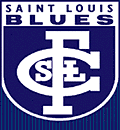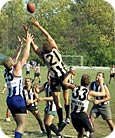| home | our mission | contact us | issue archive |

May 2001 / games :: email this story to a friend

Wanna Play Footy?
By Brent FeeneyOn Tuesday evenings and Saturday mornings, if one strolls around Forest Park and ventures to a field behind the tennis courts near the Muny Opera, one might find a group of men playing some sort of strange sport.
The average person would see these folks running around with what looks to be a rugby ball, except they are kicking it around to a teammate who "takes a mark." They hold the ball in one hand and punch it with the other when they practice "handballing." They practice techniques called "shepherding" and "smothering." They play positions called "center half-forward," "ruck rover" and "back pocket." Some of the instruction and conversation is punctuated with a foreign accent. Shouts of "you're hot!", "have a run!" and "bloody white maggot!" punch through the air.
What these folks have stumbled upon is a real-life mixture of native St. Louisans and Australian expatriates playing a game known as Australian Rules Football.

These players aren't playing just for fun — they comprise a now four-year-old club in the St. Louis area known as the St. Louis Blues Australian Rules Football Club. Most people in the area may have come across "Aussie Rules" quite by accident over the years while channel-surfing on cable television. The game was a staple of ESPN during its formative days in the early 1980s, where it became the best-known reason to watch the then-fledging network.
The game is memorable for its white-jacketed officials who point their index fingers outward after a score. (For the record, those chaps are known as goal umpires and the two fingers they point indicate that a team has scored a goal.) Others may remember the game for the players who hit as hard as American footballers — without wearing any sort of padding. Others may remember the apparent lack of rules during a "footy" match.
In some ways, it's a lot harder to watch a match these days; today, Aussie Rules is available only on Fox Sports World, which is available only to AT&T Broadband digital cable subscribers, though it's much easier to follow the main league, the Australian Football League, thanks to the Internet. But those who really want to see what all the hubbub is about only have to go as far as Buder Park in South County, where the football Blues play their home matches.
For those who represent the St. Louis club, all it takes is one match or a few practices to get hooked on the sport.
"I used to watch footy on ESPN when I was a kid," recalled current Blues club president Jim Martin, who by day is a corporate lawyer for a downtown St. Louis law firm. "I thought it was pretty unusual, seeing these guys running around hitting each other, then stopping every so often so someone could kick the ball and the guys in the coats pointing their fingers. I couldn't believe what I was seeing at times. It was almost like organized chaos out there. I thought it looked pretty fun."
Martin was at Kilkenny's, a bar in Clayton, with a co-worker and a club member she was seeing at the time.
"The guy I was talking to turned out to be a member of the club (Ryan Richardson, a St. Louis native who once served as club president before moving to the San Francisco area)," Martin said. "He mentioned he played for an Australian football club in town. I looked at him and pointed my fingers like a goal umpire would. He started talking about the club and about how fun footy was and asked me to come out and give it a try at practice. I hesitated at first, but I gave it a try and had fun. I wasn't all that great at first with the skills and got frustrated, but I decided to stick it out. After I played in my first match, I was hooked."
The club was formed at a meeting of several Australian natives living in the St. Louis area and some Americans they had recruited at Ozzie's. The club was formed by Sam Ingram, a native of Melbourne, Australia, who was a passionate supporter of the Carlton Blues, one of several clubs in what would become the AFL in 1897. (Australian football itself dates back to 1858 and may be the oldest known code of football in the world.) Ingram decided to name the club the St. Louis Blues, not after the hockey team and song, but after his beloved navy blues in Melbourne.
The Blues joined the fast-growing United States Australian Football Association (now known as the U.S. Australian Football League) and played matches against clubs that had formed in the Midwest in cities like Kansas City, Chicago, Nashville and Milwaukee. Curiosity about this unusual sport quickly spread, thanks to several media reports, and more and more people came out sample Aussie Rules.
While footy is still regarded as a cult sport among some American media outlets, in Australia, it's more than a game — it's part of the social fabric. In fact, it can be argued that no sport, except perhaps hockey in Canada, means more to the culture of a nation than Aussie Rules does to Australia.
"I grew up rooting for Carlton and the Sturt football club in Adelaide," said Adelaide native Cameron Murray, who currently lives in the St. Louis area and has been a part of the Blues since the beginning. "We grow up eating, breathing and sleeping football. I didn't play in any organized leagues, but I did play socially when I was a kid. Football is a part of life there. I've been here for five years now, and when I mention Australian football to people here, there's a lot of curiosity about it, but people really don't understand it. They confuse it with rugby or think about the goal umpires or think about how rough the game looks to them, when in fact, Australian football is a very skilled game."

Murray is correct; it takes plenty of skill and practice to be able to kick the ball with either foot for long distances and with pinpoint accuracy. Players could be delivering the ball to a teammate or kicking for a goal, which is scored when the ball passes between a pair of sticks placed into the ground that are 6.4 meters apart from each other without being touched. If the ball passes between a goalpost and another, shorter post 6.4 meters apart from either goalpost, strikes a goalpost or is touched before crossing the goal line, a behind is scored. Goals are worth six points; behinds are worth one point.
Sometimes, even Australians who are in St. Louis are surprised by the presence of Aussie Rules in the Gateway City.
"I saw some recruiting posters around campus," said Adrian Munro, a Melbourne native who is in St. Louis as part of a lawyer-exchange program between Washington University Law School and Monash University in Melbourne. "When I saw the posters, I was very excited; like people in the Melbourne area, I'm very passionate for football."
Munro, who has coached football in the Australian army, is coaching the Blues until early May, when he is scheduled to return to Melbourne. He's impressed with the skill level of American players, who currently make up a majority of the Blues.
"They're much better skillwise than I thought they might be," Munro said. "What I'm trying to do is help them start thinking like Australian footballers, especially in game situations."
While the practices and games are important, equally important to the fabric of Australian football are its social activities. In Australia, when a person purchases a season ticket to his or her favorite AFL club, they don't just get to see that club's home (and in most cases, away) matches — they are purchasing a full membership in the club and actually get a say in how the club operates, as well as the chance to use the football club's banquet facilities, bar and other venues where players are often in attendance.
"The club environment is an important part of Australian football," Murray said. "We're trying to develop that with our club. We all hang out together, go on road trips to out-of-town matches together and really have a great time. And when clubs come here to play us, there's a real economic benefit — they spend the night in hotels, purchase meals and fuel and get to see what St. Louis has to offer."
"It's a great way for me to meet different people," Martin said. "We can go out and play as hard as we can against another club during the day, then get together for a beer after the match."
The Blues are always looking for new players and supporters to take part in club and match activities. For more information on the Blues, the club web site is www.bluesfooty.com. For information on Australian football, the USAFL site can be accessed at www.usfooty.com; for information on the Australian Football League, the league's official web site is www.afl.com.au.
Brent Feeney is a native of Granite City who now lives in south St. Louis and has been an enthusiastic Aussie Rules fan since he saw his first match on cable in 1980. He also serves as a goal umpire for the football Blues and says he's never blown a call, though he has been called a "white maggot" (a derogatory term for any footy official) a time or two.
Church and State | Games | Expatriates | Communities | From the Source
It's All Happening | Young Minds | The Ordinary Eye | Elsewhere
Sights and Sounds | Media Shoegaze | A Day's Work | From the Editor© 2001 The Commonspace
